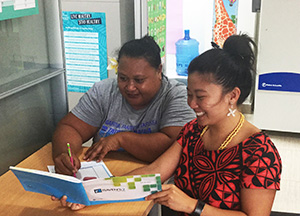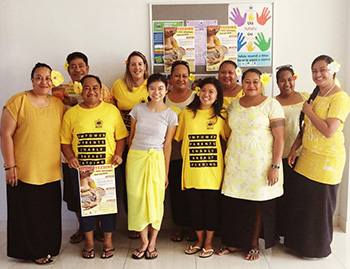 Courtney Choy, a PhD candidate in Epidemiology, is continuing her research in Samoa this year on the health and development of Samoan children as a Yale-Brown IvyPlus Exchange Scholar and a US Fogarty Global Health Predoctoral Student Scholar.
Courtney Choy, a PhD candidate in Epidemiology, is continuing her research in Samoa this year on the health and development of Samoan children as a Yale-Brown IvyPlus Exchange Scholar and a US Fogarty Global Health Predoctoral Student Scholar.
She is a founding investigator of the Ola Tuputupua'e “Growing Up” cohort study, which was established in 2015 while she was completing her master’s of public health (MPH) degree at Yale. To date, the study has recruited 500 mothers and children from 11 villages throughout the Samoan island of Upolu to conduct assessments of their health and development, first when the children were 2-4 years of age and then a second assessment two years later when the children were ages 4-7.
“It is such a privilege to work with people who are beautiful human beings—on the inside and out—that I genuinely enjoy being around. I am especially grateful for the families in the Ola Tuputupua’e study who have welcomed us into their homes and trust us with their information to understand how children are growing up in Samoa,” she says of her experiences thus far.
Choy was drawn to this project because there is very little current information about the health and development of Samoan children and the knowledge that young children are particularly vulnerable to malnutrition in all its forms (stunting, underweight, overweight, and obesity).

Choy explains, “with adult cardiometabolic non-communicable diseases (NCDs) prevalence increasing, we recognized the need to (1) understand at what age risk factors for these conditions were established, (2) determine what behavioral, environmental, or biological characteristics of children may best predict their later risk of developing cardiometabolic NCDs, and (3) recommend intervention strategies to prevent and manage cardiometabolic risk.”
This year, Choy is working at the Samoa Ministry of Health in the Samoan Obesity, Lifestyle, and Genetic Adaptations Study Group (OLaGA) Research Center leading a third follow-up assessment for the study, which will directly contribute data to her dissertation work. She hopes to answer the question: are there certain factors in early childhood (before 5 years of age) that predict health in later childhood (7-9 years)? The OLaGA Research Center is a collaborative project of Brown and Yale for studying the lifestyle and genetic influences of obesity and NCD in Samoa. They have also established a presence on Facebook to help share their research more broadly.
Choy has been invested in this study since 2015 when she was an MPH student at Yale and continued on the project while completing her year as a Fulbright Scholar at the Samoa Ministry of Health in 2016-2017. She was drawn to Brown for her doctoral studies and the opportunity to continue this research in Samoa with Stephen McGarvey, Professor of Epidemiology and Anthropology and Director of International Health Institute, Nicola Hawley, Adjunct Assistant Professor of Epidemiology at Brown and Assistant Professor of Chronic Disease Epidemiology at Yale, and Leausa Toleafoa Dr. Take Naseri, Adjunct Associate Professor of Epidemiology and Director General/CEO of Samoa Ministry of Health, who together have more than 50 years of experience in the Pacific characterizing the disease burden. “They have been exceptional mentors to me,” says Choy. She is in the third year of her PhD program.
“The strong mentorship and the flexibility of Brown’s program has allowed me to extend my master’s research and develop a personalized training plan in advanced epidemiological and statistical methodologies. Learning global health by doing global health,” says Choy.
She explains that it has taken a substantial amount of time and resources to support all dimensions of this research—whether it be purchasing equipment, scheduling for a home visit to administer an interview, data analysis, or the dissemination of findings in Samoa and abroad.
“With good teamwork, we have been able to address challenges that come our way. Our work would indeed not be possible without the incredibly hardworking OLaGA team, families who put their trust in us, and also our strong partnerships in Samoa, especially at the Ministry of Health, Bureau of Statistics, and Ministry of Women, Social Development, and Community,” says Choy.
Thinking ahead to her life after Brown, Choy hopes to continue to build a strong evidence base to drive sustainable policies and efficacious interventions to promote and maintain optimal health and well-being across the life course among communities in the Pacific.
“My heart will always be in the Pacific and so it has always been my intention to support global public health training, capacity building and development in this region after my graduate training as a NCD epidemiologist,” she says.
At Brown, Choy has received multiple awards to support the Ola Tuputupua’e cohort in Samoa, including the Nora Kahn Piore Award, funding from the Framework in Global Health Program, as well as from the Population Studies Training Center and the Department of Epidemiology. She received a perfect score on her first National Health Institute training grant submission sponsored by McGarvey, Hawley, and William Johnson at Loughborough University and was awarded the Ruth L. Kirschstein National Research Service Award Individual Predoctoral Fellowship.
Courtney Choy is from Waipahu, Hawai’i and a graduate of Punahou School. She earned a B.S. in Biology of Global Health (with a minor in Theology) from Georgetown University and a MPH in Chronic Disease Epidemiology and Global Health Concentration from Yale School of Public Health.